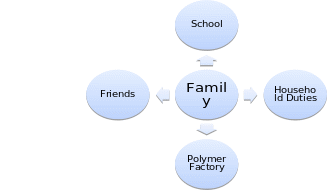The interview was taken from a small family living in a house with heating, a kitchen, and amenities. The family composition included father, mother, and child of eight years old, ethnicity – Hispanics, middle class, and Catholicism as the family’s main religion. The father works as an engineer at a factory to produce polymer compositions and provide for the whole family; she brings up her son and does not work. The father in the family smokes a little less than a pack of ordinary cigarettes a day; a smoking area is set aside on the street, there is no smell of tobacco in the house. The father also tries to participate in household chores, raise his son to the extent possible, and find free time.
The family evaluates their health as an average for various indicators. The mother often experiences increased pressure and stress on the heart, although she is not genetically predisposed to these diseases. Against the background of constant work, a father can fall into a sad mood, partially reaching depression, against which manifestations of physical ailments are possible. The son grows up relatively healthy but at the same time withdraws into himself and does not tell his parents about pain or discomfort. The family would be happy to solve these problems but lacks time.
The head of the family is the father; behind him, there are always tough decisions, but the mother decides most of the household chores and smaller tasks. In general, household chores are for the mother since she does not work; however, as far as possible and in a good mental state, the father is connected to help. The child is an excellent student but relatively modest and secretive; he practically does not talk about his problems. The family tries to eat healthy food, practically minimizing fast food, allowing his child only on holidays. Due to mental disorders, sleep in the father and mother may suffer, negatively affecting health. Time for activity is quite rare; there is no strict systematization in the load. The family immediately turns to qualified specialists in medical institutions without resorting to folk remedies in severe illnesses.
The most vital points in the health pattern of this family are role relationships and nutritional-metabolic. The whole family looks suitable, fit, and slender in physical terms, resulting from careful control over food. Consistency in roles and relationships within the family, even though the child is withdrawn, has excellent potential to correct other more problematic patterns, even in the context of the current pandemic (Prime et al., 2020). Mothers, first of all, do not have enough busywork, outdoor activities, or hobbies that would take them apart from spending time with the child. In addition, the mother is constantly at home, which as a result, rarely goes outside and does not receive the production of vitamins from sunlight, rarely breathes fresh air. In good weather, walking and active exercises, outdoor games with the whole family will be better than all medicines. With good relationships and maintaining roles and each other, the family needs to consider the activity as a necessary daily load, which in turn will allow the body to relax much better.
As a result, sleep and rest may improve, which is disturbed because of the lack of appropriate load and constant routine in household chores. The father is exhausted at work since the development of polymer compositions requires constant monitoring and work. The necessary relief in the form of activities within the family can improve psychological bonds between family members and reduce the possibility of developing mental illness and depression (Gengo e Silva Butcher & Jones, 2021). Being able to re-energize in an appropriately relaxing environment is very important under these working conditions. On weekends, the family is recommended to travel or hike to some forests or parks, where the air is immaculate, which family members are deprived of at home. The father, moreover, often smokes, which can also negatively affect sleep, especially when the family consumes coffee in the morning. Against the background of such activity, to prevent the development of diseases in the respiratory tract of the father, it is gradually necessary to reduce smoking to a complete cessation.
Finally, the cognitive-perceptual pattern will improve as all activities are gradually introduced into the routine of this family. First, the father’s sense of smell, taste, and tendency to weakness and depression will improve by quitting smoking. Secondly, the mother, spending more time outdoors and doing activities with her son, will not only be able to psychologically get closer to him in order to ask about problems calmly but will also find more time and energy for her affairs that are not related to the home or raising a child. The son, in turn, will feel the presence of the family in his life, will more often trust them with important events from his own life, and exclude the possibility of developing mental illnesses like depression, following the example of his father. The eco-map and genogram are presented on figures 1 and 2 respectively.


References
Gengo e Silva Butcher, R. D. C., & Jones, D. A. (2021). An integrative review of comprehensive nursing assessment tools developed based on Gordon’s Eleven Functional Health Patterns. International Journal of Nursing Knowledge, 32(4), 294-307. Web.
Prime, H., Wade, M., & Browne, D. T. (2020). Risk and resilience in family well-being during the COVID-19 pandemic. American Psychologist, 75(5), 631. Web.

